Cover image: Sage’s Knowledge by Ding Songjian
Read our other entries: Introduction; The Yellow Scarves Rebellion; Dong Zhuo Takes Control; The Dying Embers of Rebellion; The Rise of Cao Cao; Cao Cao Conquers the North; The Battle of Red Cliffs; How the West was Won
Now that Liu Bei had a land of his own, Sun Quan became impatient for the return of Jingzhou, as Liu Bei had promised. However, Guan Yu refused to withdraw. Sun Quan began to concoct schemes but initially failed, finding his attention diverted once again by Cao Cao…
Cao Cao Holds the Line (215-217 CE)
Commanding a vast enough army to pressure both Shu and Wu kingdoms, Cao Cao divided his efforts. Advancing on Shu, he sent Xiahou Yuan and Zhang He as vanguard toward the city of Hanzhong, with Xiahou Dun and Cao Ren as rearguard. To defend against Wu, he left Zhang Liao and two other generals at Hefei.
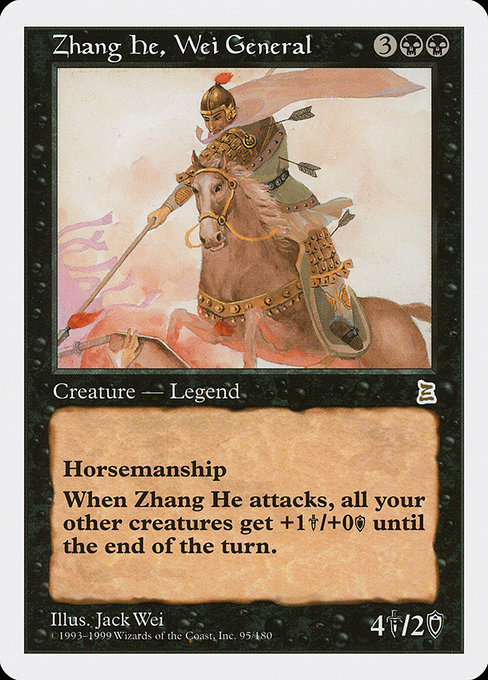
Zhang He and Xiahou Yuan took Hanzhong easily, defeating Ma Chao’s ally Pang De, who had stayed there rather than going south to Shu. After such a decisive victory, Sima Yi advised Cao Cao to press on and attack Liu Bei, but Cao Cao instead chose to bide his time.
Hoping to divert Cao Cao’s attention, Kongming sent a messenger to Sun Quan, advising him to use the opportunity to take the castle of Hefei. Zhang Liao was prepared however, and managed to repel Sun Quan yet again, forcing the Wu armies back to Ruxu.
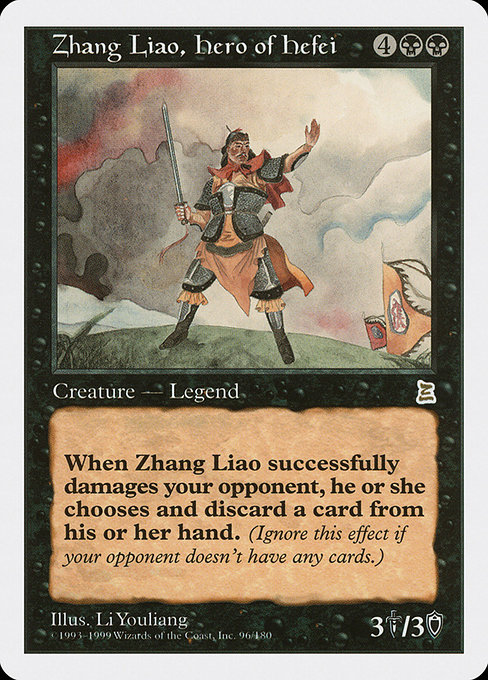
After the attack on Hefei, Cao Cao sent an army of 400,000 to assist Zhang Liao’s forces. The Wu and Wei forces were at a stalemate until an elite team of 100 Wu Elite Cavalry, led by Gan Ning, rode through the Wei camps after nightfall. They spread disorder and panic among the ranks as they rode from one end to the other, slaying all who crossed their path.
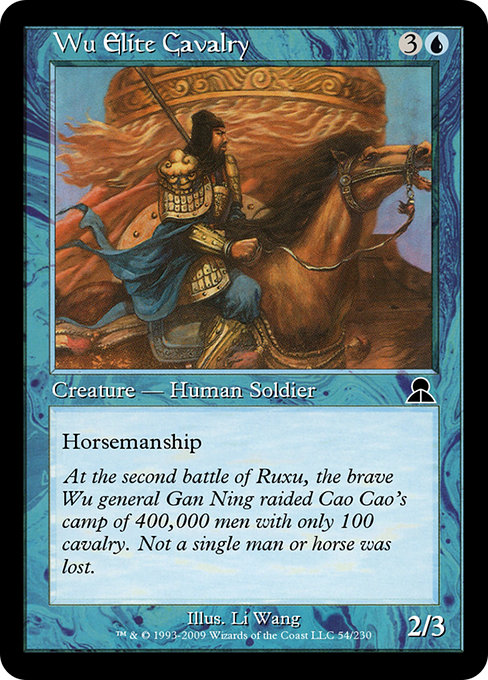
Despite having dealt Cao Cao’s forces a heavy blow, Sun Quan could not prevail against such a vast force, and the two sides eventually agreed to a truce. Sun Quan’s forces remained at Ruxu, and Cao Cao’s remained at Hefei.
Zuo Ci Curses Cao Cao (ca. 216 CE)
When Cao Cao returned to the capital, the court petitioned the emperor to name him king of Wei. The emperor did so; Cao Cao named his eldest son Cao Pi his heir, and established his own palace.
When the palace was complete, a wandering Taoist priest named Zuo Ci sought an audience with him. During the audience, the sage drank 100 liters of wine and consumed a whole sheep, and boasted of being able to ride the winds, pass through stone, shapeshift, and decapitate opponents with a flying sword. He then invited Cao Cao to retire, and learn the ways of the Tao with him on his mountain.
“It may be nice to retire,” Cao Cao mused, “but I have yet to find the right person to assist the court.”
“Liu Bei is a scion of the royal house,” the sage replied, “you should yield this position to him. Else, I should send a sword for your head!”
Incensed, and believing the sage to be an agent of Liu Bei, Cao Cao had his men seize the sage, beat him, jail him, and deprive him of food. At the end of seven days, Zuo Ci showed no signs of being harmed or hungry. Cao Cao could not subdue him.
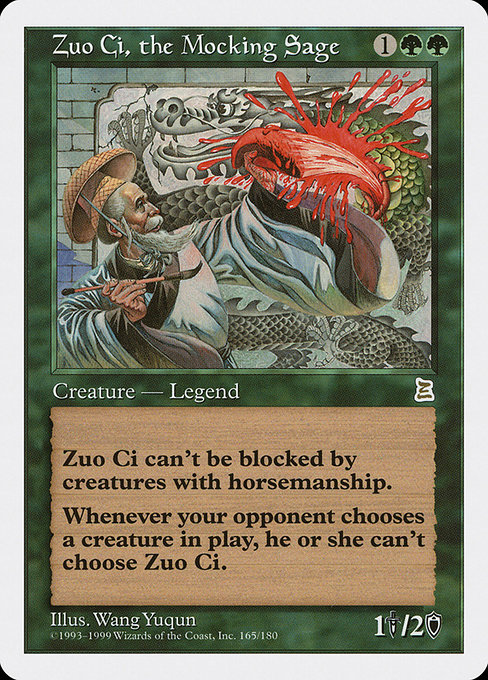
While at the palace, Zuo Ci worked wonders, pulling a bleeding dragon’s liver from a flat drawing, making flowers grow spontaneously, fetching fish from a distant river, reproducing a long-burned text, and turning a cup into a dove. As the people were dazzled, Zuo Ci left the palace.
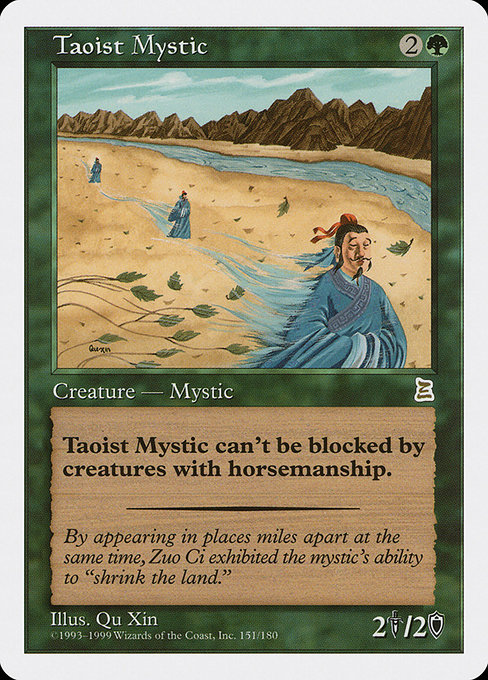
Fearing what might happen if such a powerful wizard were left alive, Cao Cao sent guards after him, but Zuo Ci took the form of a sheep and hid among a flock. Cao Cao’s men killed every sheep, leaving their shepherd boy distraught, and left. When they had gone, Zuo Ci brought all the sheep back to life, comforted the boy, and disappeared.
Enraged, Cao Cao set out to find Zuo Ci, arresting anyone who looked like him—three hundred men, all who looked exactly like the sage. Taking them to a field, he killed all three hundred. From each corpse, a trail of blue vapor arose, coalescing to form Zuo Ci, who, riding on a crane, laughed and cursed Cao Cao: “Earth rat follows golden tiger. The Villain is shortly doomed.”
Cao Cao and his men cowered in fear as a dark wind blew, and the three hundred corpses rose from the ground, marching toward Cao Cao as if to strike him down. When all seemed lost, the wind ceased, and the sage and the corpses vanished.
Guan Yu is Defeated at Jingzhou (219-220 CE)
Due to the superior tactics of the Shu forces, Zhang He and Cao Cao were forced to abandon Hanzhong. In a move that recapitulated the founding of the Han Dynasty, Liu Bei took Hanzhong, just like the first Han emperor, and appointed the five tiger generals: Guan Yu, Zhang Fei, Zhao Zilong, Huang Zhong, and Ma Chao. In the wake of his armies’ defeat, Cao Cao was furious. Instead of returning to directly attack Liu Bei, however, Sima Yi proposed allying with Sun Quan to take Jingzhou.
Sun Quan weighed his options and decided to see, instead, if Guan Yu could be made an ally against Cao Cao. He sent Zhuge Jin to offer the princess of Wu’s hand in marriage to Guan Yu as a way of formalizing an alliance. Guan Yu, in his pride, refused.
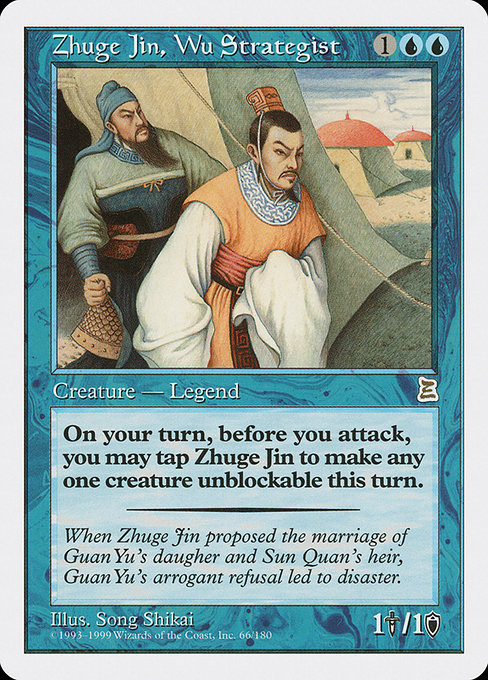
Learning of this, Kongming guessed what would come next, and had Liu Bei send Guan Yu north with his armies to attack Cao Cao, frustrating Sun Quan’s attempt to pincer the God of War. Guan Yu crushed Cao Ren’s army at Xiangyang, and pushed on to Fancheng. Guan Yu again used the Broken Dam technique to drown seven of Cao Cao’s armies, but was wounded by a Poison Arrow during the battle. Guan Yu’s son sent for a skilled doctor, and famous physician Hua Tuo came.
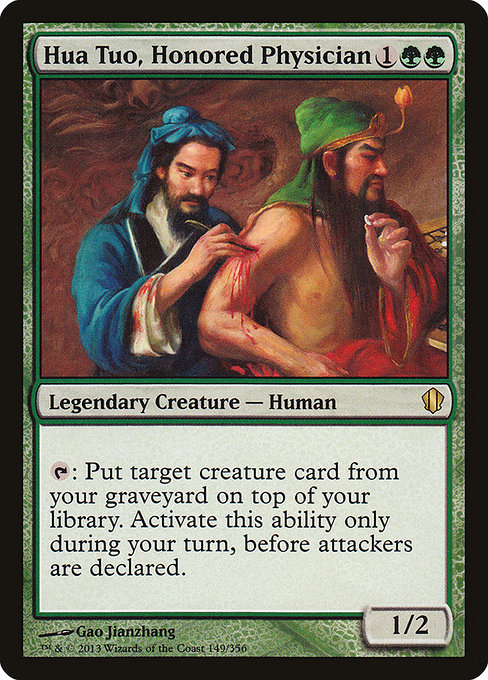
Hua Tuo tended the wound, removing the poison, but gave Guan Yu the same advice he had given Sun Ce: “You must not lose your temper, or the old wound will reopen.”
With Cao Ren hard pressed, Sima Yi had Cao Cao send word to Sun Quan that now was the time to strike against Jingzhou. Rather than attack openly, Sun Quan, Lü Meng, and Lu Xun feigned weakness, and sent gifts, pleading to restore good relations.
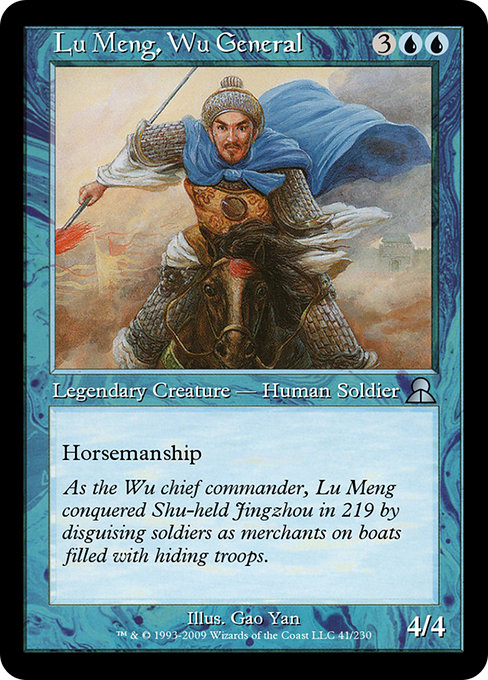
The plan succeeded. Guan Yu lowered his guard, and Lü Meng, with a contingent of disguised soldiers, effortlessly took Jingzhou, leaving Lord Guan trapped between the armies of Wu and Wei. Unable to marshal enough forces, he was captured, brought to Sun Quan, and executed.
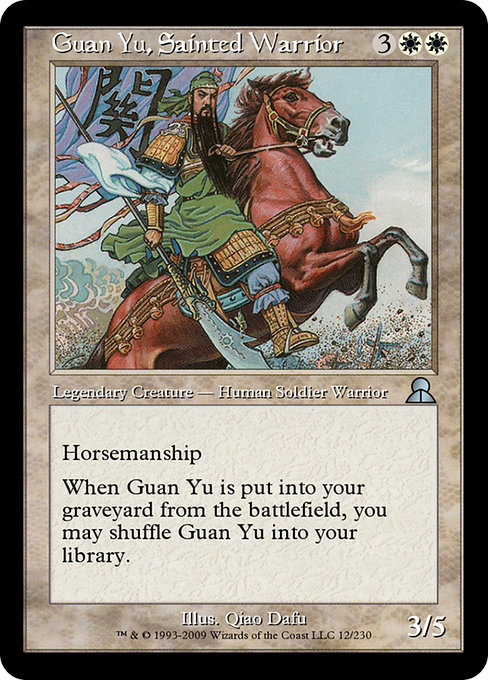
Bodhisattva, Sainted Warrior, God of War
Guan Yu’s death caused Red Hare great sorrow, and the glorious steed died several days later. Legend has it that “the vapor from Lord Guan’s soul remained undissolved, floating attenuated until it came to rest on Jade Springs Hill,” where a Buddhist monk dwelt. Disoriented in death, the spirit of Guan Yu consulted the monk, whom he had met once, long ago.
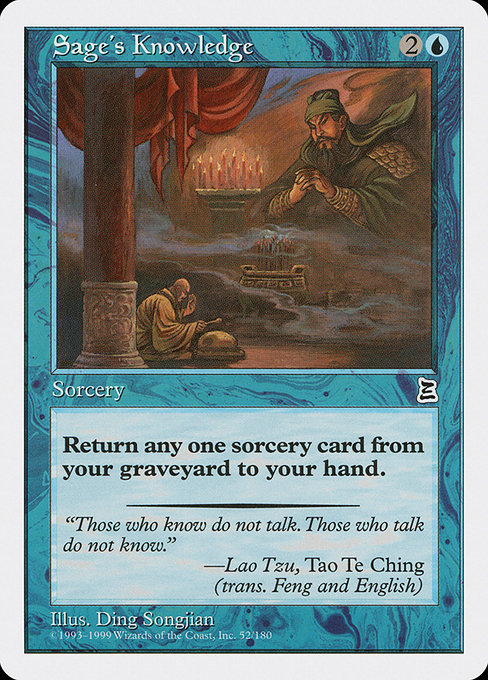
The monk reminded Lord Guan of the “Buddha’s law of Karma,” and Guan Yu had a flash of insight, understanding the justice of his own death. Luo’s text continues, “Thereafter he frequently manifested himself in divine form on Jade Springs Hill to afford protection to the common people . . . the local dwellers showed their gratitude by building a temple on the summit, where they made offerings each season.” Later someone inscribed the following couplet on the temple wall:
Behind the ruddy face, a ruby heart—
Lord Guan astride Red Hare outrode the wind.
But far as he rode, he served the Fire King.
By oil lamp light he studied history;
In war he trusted to his dragon sword.
His inmost thought would welcome light of day. (p.586)
In the wake of his death, the spirit of Guan Yu then possessed and killed Lü Meng at Sun Quan’s court, terrifying all present. Realizing he’d made a huge political mistake, and hoping to divert Liu Bei and Zhang Fei’s wrath toward Cao Cao, Sun Quan sent Guan Yu’s head to Cao Cao, but Cao Cao saw through his ruse, and instead honored Guan Yu’s memory with a funeral, conferring on him posthumous titles and personally making offerings at his tomb.
Shortly thereafter, the spirit of Guan Yu visited Liu Bei in a dream, urging him to avenge him. Waking in a fit and wracked by grief, Liu Bei made plans to march on Wu: “Until I’ve gnawed their flesh and exterminated their clans, my humiliations will not be effaced.” (p.612)
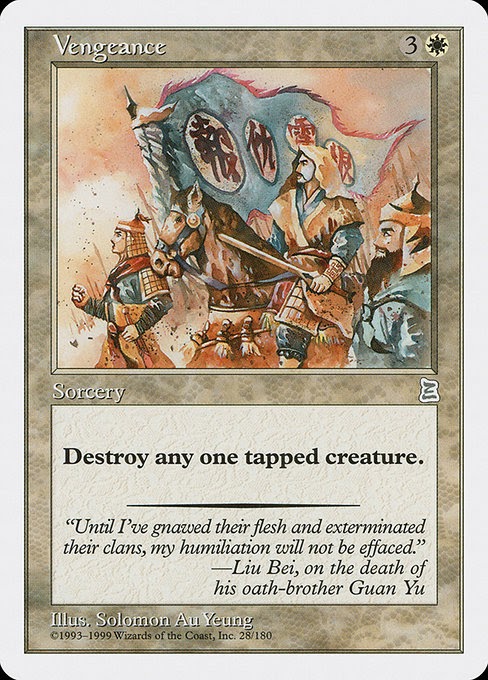
What Was Not in the Cards
This week’s summary contains perhaps the wildest display of magic and the supernatural in the Romance of the Three Kingdoms. Whereas previous Taoist magic is shown to control the weather, or spectral soldiers, Zuo Ci does these things as well as conjuring food and items from far away places, bringing animals back to life, and transmuting objects into living beings.
Thus, I think we should add some cards that reference this, and raise the magic level a bit. Phantasmal Image can serve for conjured soldiers or illusory walking corpses, and Tireless Provisioner (renamed and retyped as a human) and Fortifying Provisions are also thematically appropriate, even without a sage’s conjuring magic. Return to the Ranks or Brought Back would be a great boost to white’s ability to reanimate, and we might even consider strengthening green here as well, with Dwell on the Past or Wildest Dreams. A whole flock of sheep came back to life, after all.
We also get one of the only explicit references to Buddhism in the entirety of the Three Kingdoms. While it’s true that Liu Bei is described as being the spitting image of a Buddhist icon (long ears, small lips, wide set eyes), Guan Yu here is described as experiencing posthumous enlightenment, and becomes a Bodhisattva and guardian deity in almost all Chinese religious expressions. This approaches some territory that I want to handle with care—representations of religious topics should be, after all.
Thus, I don’t want “Guan Yu, Sangharama Bodhisattva”; though I think we might nod to this concept in the novel by including “guardian spirits,” as has been done in other Magic sets: Ageless Guardian, Forbidding Spirit, Ghost Warden, and Phantom General are all non-flying spirits we might consider “reprinting” into this set.
Read On!
The death of Guan Yu has provoked the wrath of his surviving oathbrothers, turning a political war into one that is now deeply personal for Liu Bei and Zhang Fei. However, our heroes are aging. Once young and indomitable, their strength begins to fade. Will Liu Bei succeed in his quest for vengeance against Sun Quan? Will Cao Cao remain Sun Quan’s ally? Read on!
Recommended Media
Luo Guanzhong, Three Kingdoms (trans. Roberts, 1991), Ch. 66-77 (pp. 503-589).
Zhang Qirong & Li Chengli, Romance of the Three Kingdoms (Asiapac Comic Series: 1995/2006), Vol. 7.
Jacob Torbeck is a researcher and instructor of theology and ethics. He hails from Chicago, IL, and loves playing Commander and pre-modern cubes.



